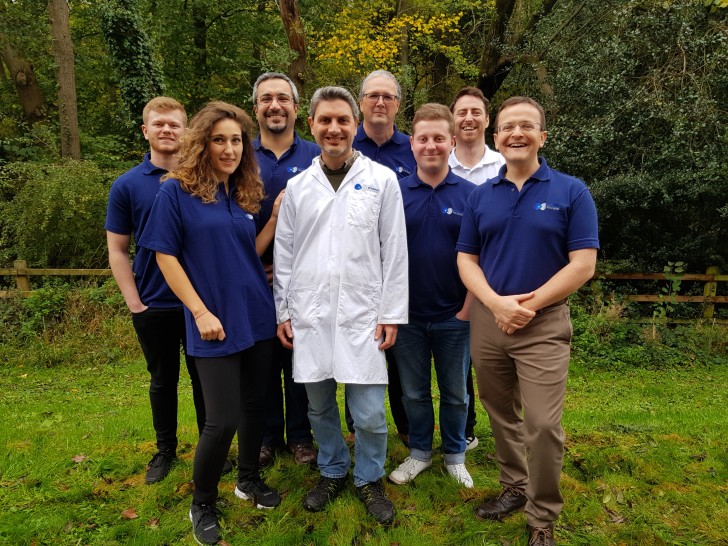Interface Polymers selected as BASF and Greentown Labs Circularity Challenge Finalist
 Interface Polymers Ltd. is a finalist in the BASF and Greentown Labs Circularity Challenge, a disruptive innovation program initiative for startups. The Circularity Challenge is a six-month accelerator program, designed to advance innovative new solutions for a circular economy to help the environment. The five startups selected, chosen from nearly 100 entries from around the world, are focused on finding innovative ways to enable more effective circular economies in the plastics, energy storage, and recycling value chains.
Interface Polymers Ltd. is a finalist in the BASF and Greentown Labs Circularity Challenge, a disruptive innovation program initiative for startups. The Circularity Challenge is a six-month accelerator program, designed to advance innovative new solutions for a circular economy to help the environment. The five startups selected, chosen from nearly 100 entries from around the world, are focused on finding innovative ways to enable more effective circular economies in the plastics, energy storage, and recycling value chains.
The aim is to close cycles and use products and resources in the best way possible across the entire value chain, preferably powered by renewable energy.

Interface Polymers R & D Team
The Circularity Challenge is a collaborative initiative between BASF, one of the world's leading chemical companies, and Greentown Labs, the largest cleantech incubator in North America. The accelerator program is also supported by Stanley Black & Decker, a leading global diversified industrial company and a customer of BASF. The challenge is focused on connecting entrepreneurs with mentors, team members, business and technical resources they need to launch or further develop successful ventures with partnership from BASF and program support from Stanley Black & Decker.
“We are absolutely delighted and honored to have been chosen as a finalist for this Circularity Challenge. It provides Interface Polymers with the perfect opportunity to interact with likeminded people, tap into Greentown Lab’s expertise in cleantech startups and to explore potential joint development opportunities using our Polarfin® additive technology with BASF, which is a major global player in the plastics industry”, said Dominique Fournier, Chairman and CEO for Interface Polymers.
Interface Polymers Ltd., established in February 2016, is a spin out from the University of Warwick. The company has offices and laboratory facilities in the Advanced Technology and Innovation Centre at Loughborough University, UK. Interface Polymers was selected as a finalist due to its highly innovative, proven di-block polymer Polarfin® additive technology. Polarfin additives enable polyolefin compatibility and surface functionality between currently non-compatible thermoplastics, such as a polyethylene with a polyethylene terephthalate or a polyamide. This unique, patented, additive technology offers the plastic industry the ability to transform the performance, cost competitiveness, recyclability and reusability of currently unrecyclable and incompatible mixed plastic products.
A key focus area of Interface Polymers for the Circularity Challenge program is to use its additive technology to provide commercially viable multi-layer, mixed plastic flexible packaging material solutions. Next generation multilayer packaging incorporating Polarfin additive technology will be easily separable using conventional recycling processes and then reused as part of a circular economy in ‘upcycled’ plastic products which need less virgin material. The Interface Polymers R & D team is currently developing next generation Polarfin-based polymer alloys, which can be cost effectively manufactured and, once used, can be cost effectively recycled multiple times and reused in higher performance, higher value applications. The aim is to provide viable alternative polymer-based consumer and industrial products to reduce landfill, ocean pollution and improve sustainability, so addressing a worldwide plastic industry waste crisis that must be solved.
Polarfin additives can be used across a diverse range of markets, applications and polymer products in the value chain including: masterbatches and compounds; thermoplastic composites; filled polymers; sheet and film products; coatings and dispersions. Polarfin additives offer enhanced material performance and reduced production costs, as well as enabling recycling across a wide range of applications in the packaging, construction, agriculture and automotive sectors.
Circularity Challenge finalists benefit from an extensive package of program help including: US$ 25,000 in non-dilutive grant funds; access to select BASF testing capabilities, global technical facilities and expertise; exclusive access to the Greentown Labs and BASF networks; partnership with and/or potential investment from BASF by the end of the program. The Circularity Challenge partners will be organizing six two-day workshops to highlight the participants and their industries, BASF’s expertise and industry leadership and also hosting a culminating event in 2020 to share startup progress, accomplishments and successful results of working closely with BASF, Greentown Labs, and Stanley Black and Decker throughout the program. www.interfacepolymers.com




